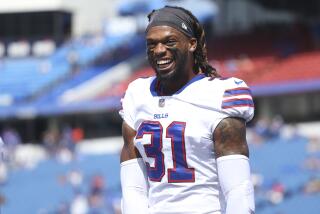Schroeder Talks of Moving to Nearby Facility : Haydon Ends First Week by Leaving Bed
- Share via
LOUISVILLE, Ky. — Murray P. Haydon ended his first week with a mechanical heart Saturday by getting out of bed as fellow heart implant patient William J. Schroeder talked about his expected hospital discharge with relatives.
Haydon, 58, of Louisville, who received his Jarvik-7 last Sunday, and Schroeder, 53, of Jasper, Ind., a three-month mechanical heart veteran, were reported to be free of any complications.
Humana Hospital Audubon said Haydon’s mild kidney problems, which predated the implant, had “resolved themselves as expected,” while Schroeder’s temperature remained normal, more evidence that he has shaken off a nagging fever.
Haydon was able to get out of bed for the first time Friday evening, standing briefly at the side of his bed. He got up again Saturday to try sitting in a chair.
Progress Termed ‘Fantastic’
Haydon’s initial recovery from the world’s third permanent artificial heart implant had been described as “fantastic,” but by midweek he was reported as weak.
Dr. William C. DeVries decided to leave the timetable for getting out of bed up to Haydon, a grandfather and retired auto worker who was given just weeks to live with a weakened heart when he agreed to the Jarvik-7 implant.
Robert Irvine, director of public relations for Humana Inc., said Saturday that DeVries was “very satisfied” with the pace of Haydon’s recovery.
“He continues to improve steadily,” according to Irvine, who said Haydon had begun drinking ice water. Haydon’s liquid intake had been limited until doctors were satisfied that his kidney problem was resolved.
Series of Tests
The hospital arranged a series of tests this weekend on Haydon to see how he--and his heart--respond to various drugs.
Haydon’s implant consent form included permission for the tests, some of which were done on Schroeder and the first artificial heart recipient, Barney Clark.
Switch to Battery Unit
Irvine said one weekend test was to include switching to the compact battery-powered drive unit intended to give mechanical heart patients more mobility than the shopping-cart-size standard drive unit.
Two doors down the hospital corridor, Schroeder had a “fine day” greeting family members and talking about his discharge, Irvine said.
No date has been set, but all indications pointed to a release soon to a hospital-owned “halfway” house across the street. Nurses will be assigned to attend Schroeder 24 hours a day at the former apartment house.
Humana said Schroeder will be discharged as soon as his family is trained to work the two alternate units that power Schroeder’s plastic and metal heart by forcing air through two drive lines to a plastic heart diaphragm.
Suffers Brain Damage
Dr. Allan M. Lansing, the hospital’s chief medical spokesman, said he doubted Schroeder would be able to operate the technology because of brain damage from a Dec. 13 stroke possibly caused by the Jarvik-7 heart.
More to Read
Sign up for Essential California
The most important California stories and recommendations in your inbox every morning.
You may occasionally receive promotional content from the Los Angeles Times.













